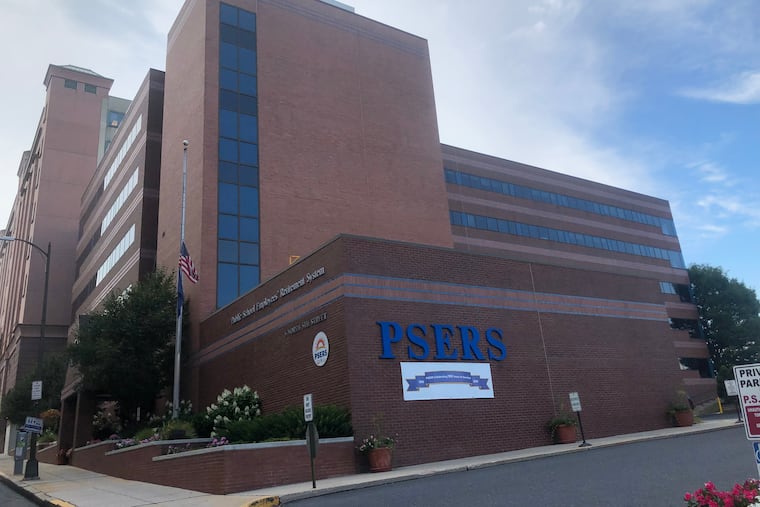How PSERS has invested $100m with a Pittsburgh billionaire and won’t say what it is for
Trustees of the $57 billion pension fund for public school employees bet $100 million on a new investment with an I-Spy name —”Project Newton"— run by a manager PSERS wouldn't name.

Is this any way to spend the people’s money?
At a hastily called “special board meeting” last Monday, trustees of the $57 billion pension fund for public school employees agreed to bet $100 million on a mysterious new investment with an I-Spy name — ”Project Newton” — run by a manager whom PSERS refused to name. Not a public word was said about how precisely Project Newton will make money for retirees.
The approval wasn’t a slam-dunk.
Among those voting no were Democratic state Treasurer Joe Torsella, acting banking secretary Richard Vague, and State Rep. Frank Ryan, R-Lebanon.
Torsella is the elected bean-counter who has pushed for simpler, low-fee investments. Vague is a venture capitalist and philanthropist who once ran the world’s largest credit-card bank. Ryan is a Marine officer turned CPA whose pension-management reform bill has been stalled by opposition from the teachers' union.
Those three have challenged the massive fund’s penchant for private investments, which they associate with high fees and low returns.
In short, the professional money people on the board did not see Project Newton as genius. But they were outnumbered by the teachers' union reps and retirees, led by a pair of high school history teachers and a pair of state senators — John P. Blake (D., Lackawanna) and Pat Browne (R., Lehigh) — who can usually be counted on to buy into the exotic investments the pension fund staff and consultants recommend.
What is Project Newton? Even the “no” voters said they can’t talk about it, due to confidentiality rules of PSERS, the acronym for the pension plan.
So I made calls around Harrisburg, and then Pittsburgh, and confirmed that Newton is another project of billionaire Thomas Tull, a co-owner of the Pittsburgh Steelers and a former big-time Democratic Party contributor.
In 2018, PSERS gave Tull’s investment firm $100 million in a likewise contested — but public — board meeting. That money went to a Tull business known as Tulco, which pumps cash and software into firms like Figs, which that markets hospital scrubs.
Now, my sources tell me, the pension plan has pumped in a second $100 million, only more quietly, directly into Figs.
(For its part, PSERS remains mum. Spokesperson Evelyn Williams replied “no comment” when I asked whether Tull had won a new round of pension money. Her agency normally posts investment applications endorsed by staff and advisers.)
According to PSERS documents, Tull chose Pittsburgh as his new base in 2017, after the $3.8 billion sale of his Hollywood production company, maker of the Batman: Dark Knight, Godzilla, and Jurassic World franchises,
His Tulco investment house, PSERS trustees were assured in 2018, is “a holding company focused on acquiring early-stage companies that are focused on utilizing technology to disrupt industries.” (Who isn’t, in venture capital these days?)
Tull, through his publicist, declined to talk about what exactly will be done with their next $100 million from PSERS. Update: Sources later confirmed it went to Figs, alongside other investors’ funds in a private stock offering.
Tull, a New York State native who describes himself as a Republican, has been a major Democratic giver, giving committees that backed Hillary Clinton and congressional Democrats over $2 million in 2016. He’s not on lists of major contributors to the 2020 races, so far.
SEC rules have discouraged money managers who contribute to politicians from collecting fees from state and local pension funds. But there’s no ban on donors to would-be presidents or members of Congress collecting fees from state pension funds for their investment shops.
Why were PSERS executive director Glen Grell and James F. Del Gaudio, the senior portfolio manager who pitched the trustees behind closed doors, so hot to back a new Figs project in secrecy?
“The review was in executive session due to the highly confidential investment information that was presented,” PSERS’s Williams said. “This information is protected from release under the Pennsylvania Right-to-Know Law, the Retirement Code, and also prohibited from release because it contains sensitive investment information that PSERS received under strict contractual confidentiality requirements.”
Maybe Figs feared that making its grand plans public would tip off competitors.
The pension plan has gone dark like this before. In 2017, it invoked similar secrecy when it spent millions buying and leveling blocks of central Harrisburg, around the corner from its own headquarters tower, without disclosing its plan.
Figs has other investors besides Tulco — there’s UnitedHealthcare, the life insurance giant, among others — so it’s not clear why PSERS was offered an early edge.
How has Tulco worked out for the state? It ought to have been a profitable time to be in the fancy end of the medical clothing business.
But when I asked if PSERS had collected a pandemic dividend, spokesperson Williams referred me to year-old PSERS records. They show Figs earned just a 2.6% return in 2019, a fraction of stock market returns for that year.
I hope for taxpayers’ and teachers’ sake it’s done better since, but neither PSERS nor Tull will talk about that.
Responding to my query, state treasurer Torsella noted that the pension fund had recently dumped some poorly performing speculative investments. He called for “a simpler, more transparent and safer approach” to investment.
And he added: “We should not be committing retiree and taxpayer funds to investments so secretive in nature that even the identity and details are unable to be shared with the public.”